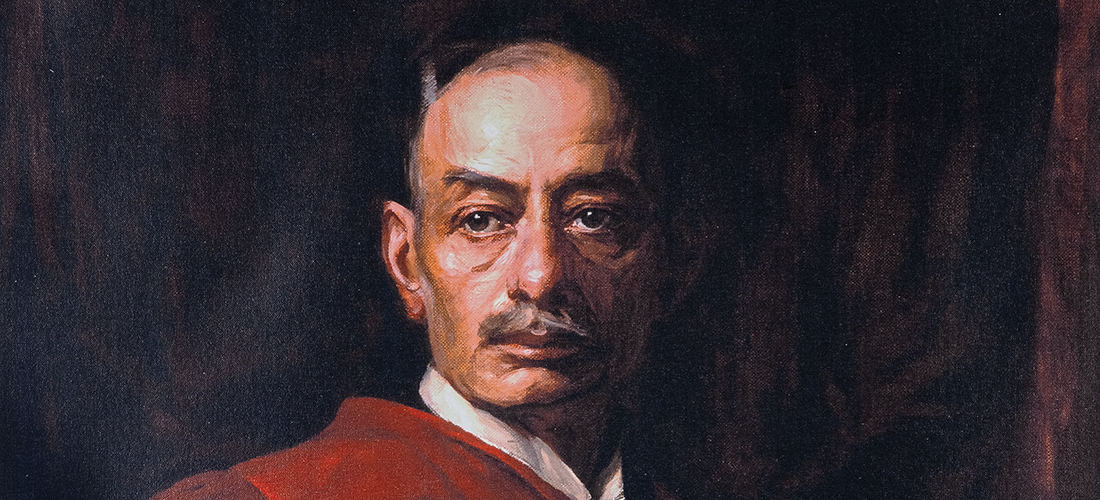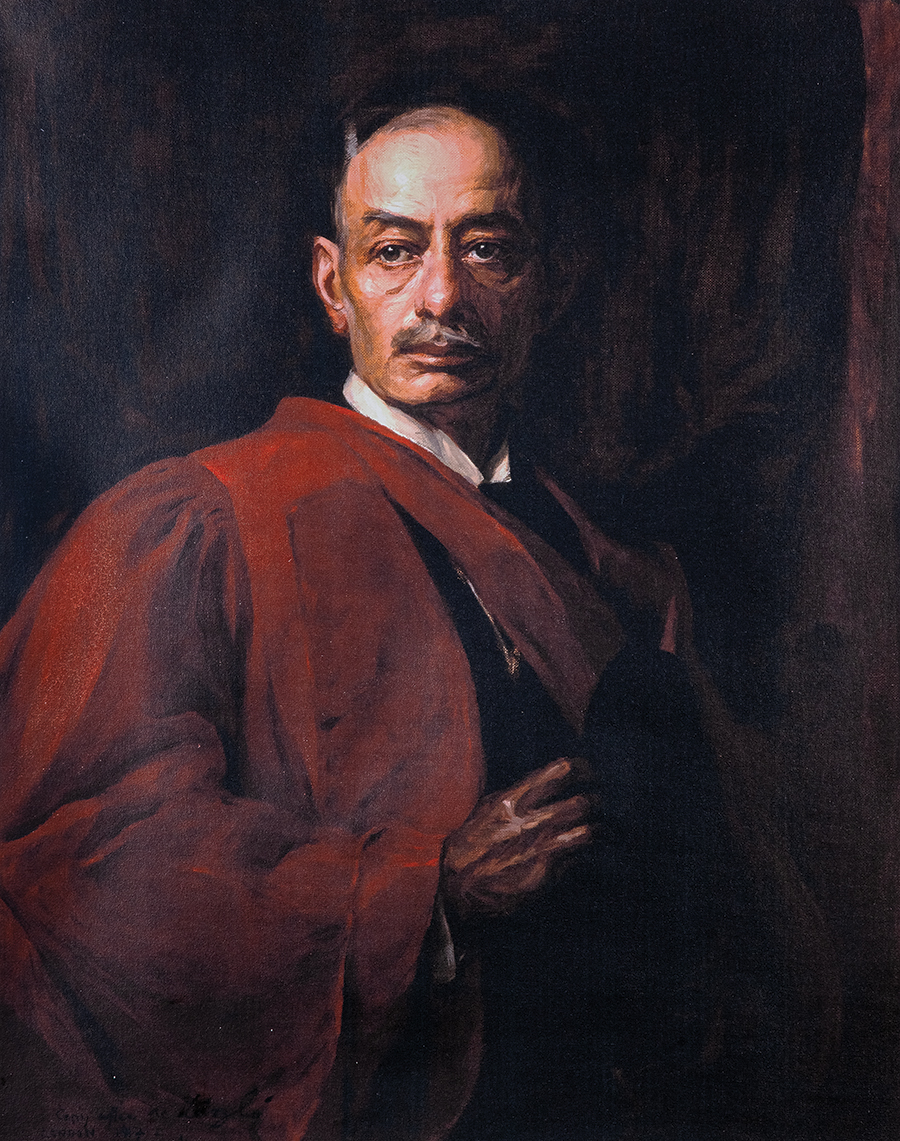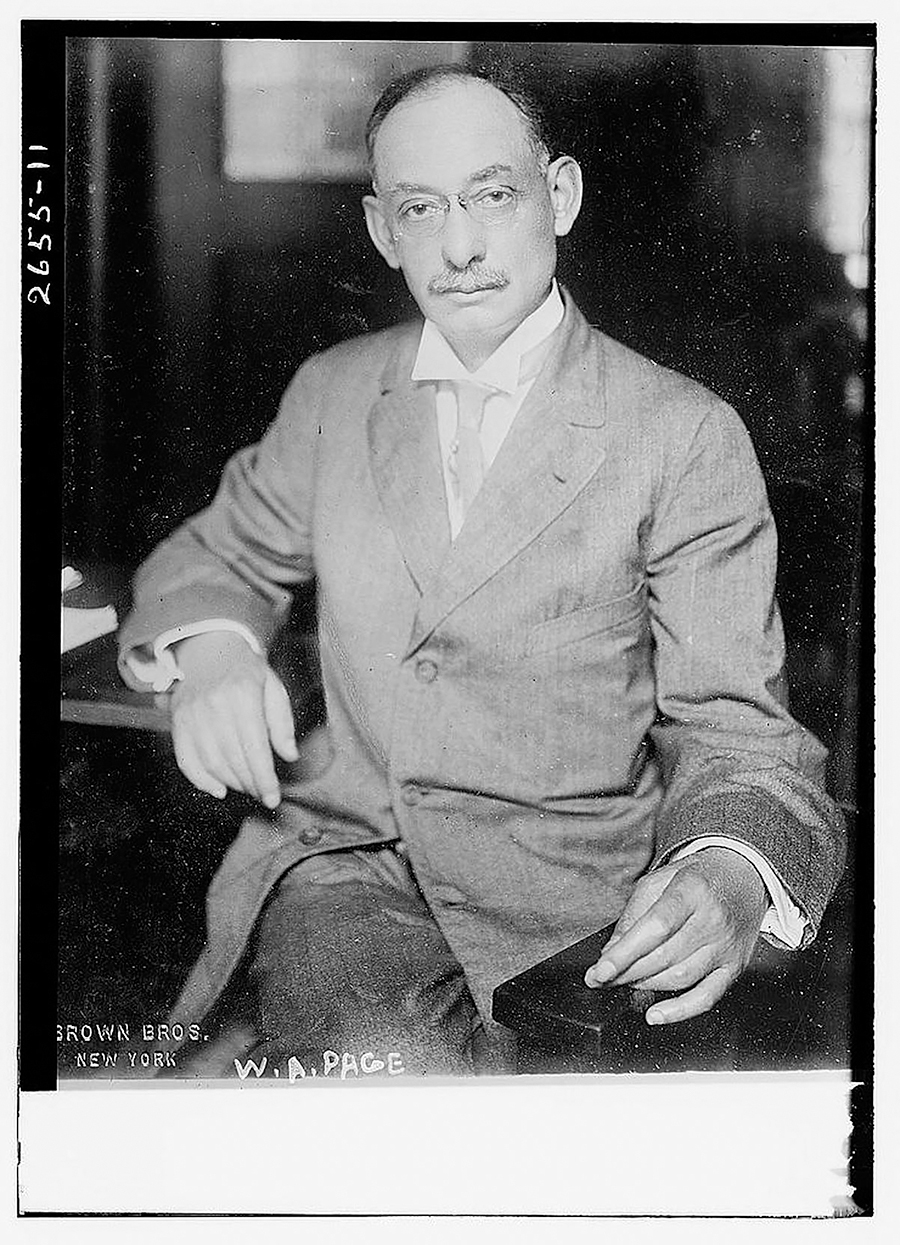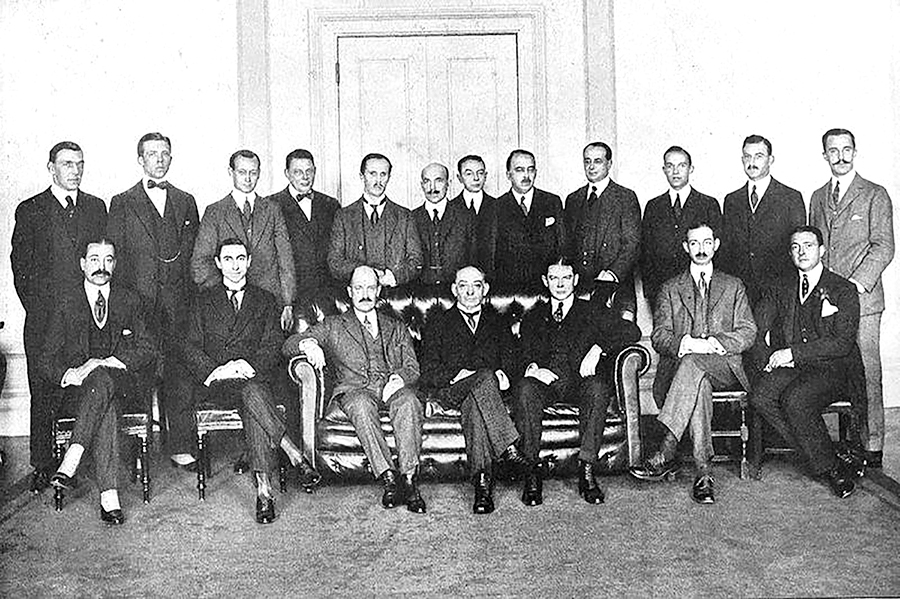
The greatness of Walter Hines Page
By Bill Case
The presidential election of 1916 was a close thing. Had Republican challenger Charles Evans Hughes carried California, a state he lost by a mere 3,700 votes, he would have become president. But Hughes lost to the Democratic candidate Woodrow Wilson, who won re-election for a second term.
Wilson spent the bulk of his first term steering America clear of the bloodbath of World War I, which by Election Day had raged over Europe for 2 1/2 years, leaving millions dead in its wake. The president’s aversion to American involvement in the conflict was reflected in two catchphrases used during his 1916 campaign: “America First” and “He Kept Us Out of War.” Wilson’s hands-off strategy was popular with a majority of voters, and led to his narrow electoral victory.
However, a growing number of Americans felt that Wilson’s neutrality policy was wrongheaded — that it favored autocratic and conquest-driven Germany over democratic allies Great Britain and France. Doubts magnified following Wilson’s response to a German U-boat’s May 1915 sinking of the unarmed British ocean liner Lusitania with 128 American passengers aboard. While the president condemned the attack, his tepid statement — “We are too proud to fight” — struck many as alarmingly weak. But few in his administration spoke in opposition, as Wilson tended to shun those who disagreed with him.
One member of the inner circle who dared to question the president’s approach was Walter Hines Page, America’s ambassador to Great Britain. Wilson had appointed his longtime confidant to the prestigious post (previously occupied by several presidents) in 1913. Page’s selection was not based on his diplomacy experience, since he had none. It had more to do with rewarding the native North Carolinian for his role in aiding Wilson’s political advancement over a 30-year period.
It was presumed the ambassadorship would provide the 57-year-old Page a mostly trouble-free conclusion to a remarkably eclectic career that had included successful turns in academia, journalism, publishing, social reform, public policy advocacy and farming. But the advent of the war threw pleasantness aside and caused damage to the collegial relationship of the two men. The ambassador considered it his duty to inform the president of British (and his own) disapproval with the administration’s failure to act more decisively toward Germany — especially regarding the Lusitania disaster. His fault-finding missives from London irritated Wilson, who complained that Page “seemed more British than the British.” A degree of frost formed over their relationship.
Page was born in 1855 in a small settlement in Wake County, North Carolina, that eventually became the city of Cary. His father, Allison Francis (Frank) Page, founded the town. A rugged, God-fearing Methodist, Frank Page made a small fortune extracting turpentine from pine trees and sawmilling them into lumber. Standing an impressive 6 feet 5 inches, he commanded respect bordering on awe. Walter’s mother, Catherine, was of a more intellectual bent, usually observed with a book in her hands.
Walter, nicknamed “Wat” in his youth, grew up during the Civil War, and its deadly turmoil left a lasting mark. When he was 9 years old a train stopped at the local station and a wooden box was dropped on the platform. The boy was told the box was “Billy Morris’s coffin and that he had been killed in a battle.” There were more to come.
The tall, gangling, curly-headed boy was viewed as something of a dreamer by his parents. An avid reader like his mother, he often hiked in the woods with just a book for companionship. His parents steered their scholarly son in the direction of the ministry, sending the 16-year-old to Methodist-run Trinity College, located in the backwoods of Randolph County (later the school moved to Durham and was renamed Duke University).
Wat was miserable at Trinity, and after an unhappy year transferred in 1872 to another Methodist school, Randolph-Macon College, in Ashland, Virginia. “It was at Ashland that I first began to unfold,” Page would later remark. “Dear old Ashland!”
Randolph-Macon boasted outstanding and broad-minded professors, and under their tutelage, Page mastered Greek, Latin and English literature. He thrived in the school’s heady intellectual environment, and evolved into a skeptic of religious orthodoxy, jettisoning any notions of joining the clergy. “I’m damned if I’ll become a Methodist preacher,” he told his father. After a disappointed Frank refused to pay for further tuition, Walter self-financed the remainder of his education.
In 1876, Page was one of 21 students gaining admittance to America’s first graduate school at Johns Hopkins University. Initially, he flourished in the intense regimen, but by the midterm of his second year, he had become bored with the nuances of Greek and Latin, disparagingly calling himself a “Greek drudge,” and left without completing his course of study.
Page’s disenchantment with classical languages did not extend to English literature. In 1878, he spent an enjoyable summer teaching it at the University of North Carolina. When he wasn’t asked back to Chapel Hill, he moved on to another teaching position in Louisville, Kentucky.
Visualizing a career in journalism and harboring “dreams and aspirations” of owning and editing a magazine, he invested $1,000 and became half-owner and the editorial writer of a fledgling Louisville weekly called The Age.
Unfortunately, it folded in June 1879, barely three months after his investment. Undaunted, Page combed his native North Carolina looking for “any sort” of journalistic position, but, as he ruefully put it, “journalism didn’t seem in any hurry to make up its mind to admit me.”

During a summer stay in Cary, Page fell in love with Alice Wilson, whom he’d first met as a teenager. The smitten couple became engaged during the 1879 Christmas holidays, postponing marriage until Page could obtain gainful employment. At the same time his father pulled up stakes in Cary and moved 68 miles south to the settlement of Blue’s Crossing in rural Moore County, where he had acquired a vast pine forest covering thousands of acres.
The elder Page began harvesting products from the trees just as he had in Cary. He established an array of related operations to bring the products to market. By damming up a creek to power his sawmilling operation, he created Aberdeen Lake. Frank Page constructed a railroad from his logging sites into Blue’s Crossing and on to Southern Pines. His entrepreneurial activities helped jumpstart development in the settlement, which became incorporated as the town of Aberdeen in 1888.
Frank and Catherine Page and most of their eight living children (but not Walter) would build homes on or near “Page Hill” overlooking Aberdeen. Among the offspring who achieved success in Aberdeen and beyond, Robert won election as a United States congressman; Henry was appointed food commissioner by President Herbert Hoover; Frank Jr. served as chairman of North Carolina’s Highway Commission; Julius (Chris) was a respected businessman in Aberdeen; John became a doctor; Emma taught for 50 years at the North Carolina State Normal and Industrial School (now UNC Greensboro); Mary was a family historian and charitable benefactor; and Jesse became an ordained Methodist minister — the calling rejected by his brother Walter.
Unable to find his footing as 1880 loomed, a breakthrough occurred in January when Walter Page landed a job as a reporter at a St. Joseph, Missouri, newspaper, The Gazette, contributing all kinds of articles “from stockyard reports to political editorials and heavy literary articles.” After five months, the publisher promoted young Page to editor-in-chief and raised his salary, giving Walter and Alice the wherewithal to tie the knot in November 1880. Hoping to parlay his knowledge of the South into his own cottage industry, Page wrote to several Northern newspapers, advising them of his intention to travel, observe and write about the post-Civil War South. “I was going to send them my letters,” Page wrote later, ”and I prayed heaven that they’d print them and pay for them.”
His Southern ramblings of 1881 proved educational. He observed that Oxford, Mississippi, “still slumbers from the narcotic influences of slavery,” contrasting it with bustling Atlanta, which “had not quite so many aristocratic shackles.” Though acknowledging that Northern capital investment and industry formation would certainly help the somnolent South, Page’s wanderings convinced him real advancement could only occur by “way of agricultural improvement,” and “popular and practical education.” He felt the region needed an infusion of cultural literacy, noting that “the poets, the novelists, the magazines, and the newspapers have done more than all the schools to stimulate the intellectual life of New England.”
Page’s letter-writing gambit succeeded. The big-city papers printed his submissions and paid for the privilege. “I had money in my pocket for the first time in my life,” he recalled. Moreover, the essays impressed the editor of the New York World, who offered Page a correspondent’s job with the paper. He accepted and headed north. His beat included congressional hearings regarding tariff measures as well as the tariff commission itself.
Page’s coverage of the commission brought him to Atlanta in 1882, where he visited his friend Edward Renick, the law partner of 26-year-old Woodrow Wilson. After being introduced, the two men engaged in a discussion regarding the merits of protectionism versus free trade. Dazzled by Wilson’s keen insights, Page urged the young lawyer to express his views before the commission. According to Wilson, Page promised him “a good notice in his letter to the World.” Believing he had discovered a budding political star, Page would gush to a colleague that Wilson “has one of the finest minds in America. Keep your eye on him!”
When the World changed ownership in May 1883, Page resigned and returned to North Carolina hoping to personally own and edit a publication in his home state. With financial help from his father, he launched a weekly newspaper in Raleigh, The State Chronicle. It covered statewide politics, industrial progress and social reform efforts. Page’s editorials lauded Democratic presidential candidate Grover Cleveland and derided local politicians as “small men” holding obsolete and parochial views.
The paper proved unprofitable, however, and in February 1885, Page ceded its control to Josephus Daniels (who would later buy Raleigh’s principal newspaper, the News and Observer), and retreated to New York. Though still revering North Carolina, the frustrated Page abandoned thoughts of making a living there. He told his father, “there is no (use) in my trying to do anything down south anymore. I have proved disastrous every time.”
Comfortably ensconced in Manhattan with Alice and two toddlers, Ralph and Arthur (who would later be joined by two more children, Frank and Katharine), Page penned freelance articles for magazines like The Atlantic and Harper’s Magazine mostly pertaining to the South and national politics. He was becoming, as one biographer put it, “a self-appointed but recognized ambassador from the South to the North.”
One series of four pieces, the “Mummy Letters,” brought him particular attention. The theme was that the powerbrokers in North Carolina — the “mummies” — had chosen to glorify the “Lost Cause” of the war rather than focus on steps necessary for the state’s recovery. Page suggested this was why “the most active and energetic men born in North Carolina have gone away (like himself).” Some back home castigated Page, accusing him of Yankee leanings, but the state’s progressive elements welcomed his criticism.
Page rose to prominence in New York’s magazine scene — a noteworthy accomplishment, since many in the Northeastern intellectual establishment looked upon Southerners as backward. In 1891, he became the editor of The Forum, a journal appealing to the well-educated elite of the city. While a struggle for control of the magazine in 1895 resulted in Page’s departure, he landed on his feet in Boston as the editor of The Atlantic — the magazine industry’s gold standard — and its book-publishing parent, Houghton, Mifflin & Company. As editor, Page cultivated the era’s top fiction writers, and expanded Atlantic’s treatment of political topics such as American imperialism and the perils of unregulated monopolies. At Page’s behest, his friend Woodrow Wilson contributed three public policy articles.
Page’s gravitation toward national politics did not deter him from expounding on a pet concern: Southern educational reform. He spoke on the subject in Greensboro at the Normal School’s 1897 commencement exercises. In his eloquent “Forgotten Man” speech, which served as an important catalyst for educational reform in North Carolina, Page maintained that the state had failed to develop its most valuable resource, “the people themselves . . . forgotten and neglected.” He decried North Carolina’s long history of providing scant resources to educate the less fortunate. These were the people whom “both the politician and the preacher have failed to lift.”

Though sitting in one of publishing’s most prestigious editorial chairs, Page still longed to be his own boss. He resigned from The Atlantic in 1899 and, after a brief misbegotten adventure with McClure’s Magazine, ventured into the book publishing business with Frank Doubleday in New York. Doubleday, Page & Company started small, but grew quickly. Page enticed prominent men of letters like Theodore Dreiser, Booker T. Washington, Rudyard Kipling and Upton Sinclair to join the publisher’s list. Woodrow Wilson’s book The New Freedom was sold under the Doubleday, Page umbrella. The company published a magazine, The World’s Work, which became Page’s primary focus.
Sons Ralph and Frank would follow their father into journalism. Ralph wrote a successful book as well as articles for The World’s Work. Frank became an editor.
Page’s partnership with Doubleday relieved him from financial distress. He was no millionaire, but he could afford a two-story cooperative apartment in the city, a home on Long Island, servants, private schools for the children, and golf.
Meanwhile, Page continued to assist Woodrow Wilson’s political advancement. He came to his fellow Southerner’s aid in 1910 when Wilson, then the president of Princeton University, successfully ran for governor of New Jersey. Wilson’s meteoric political rise was capped by his election to the presidency two years later. Page played a significant role in Wilson’s presidential campaign, raising money and providing reams of favorable publicity in The World’s Work. Following the election, Wilson met with Page to obtain the latter’s advice regarding prospective administration appointments. The Washington rumor mill speculated that The World’s Work editor would soon be appointed either secretary of Agriculture or secretary of the Interior.
Though pleased to be in the mix for a top spot, Page, by then 57, was also exploring the acquisition of a farm estate back in Moore County. Sons Ralph and Frank had gravitated there, starting a farm cooperative sales and development business. With Washington less than a day’s train ride from Moore County, Page figured, if tapped for a Cabinet post, he could commute to the Sandhills, assist his sons, and visit Page family members in Aberdeen.
While awaiting word from the president-elect, Page and his wife rented a cottage in Pinehurst, the town formed out of Moore County pine barrens by James Walker Tufts, who purchased the land, denuded by Frank Page’s logging operations, in 1895. After Walter Page arrived in Pinehurst in February 1913, he canvassed available area properties fitting his farm estate requirements and found an ideal spread 2 miles southwest of Pinehurst. With lightning speed, he struck a deal to buy it. The Pinehurst Outlook reported, “Dr. Walter Page, editor of ‘World’s Work,’ has purchased a thousand acre farm . . . upon which he will build a winter home.” Page hired an architect, who set to work designing a two-story Georgian brick house. Construction was soon underway.
Page contemplated sanguine times ahead at the farm off Linden Road he would call “Garran Hill,” where he planned to grow peaches. (The estate was renamed “Hollycrest” by a subsequent owner.) But on March 26, 1913, now-President Wilson threw the would-be country squire a curveball. Instead of the anticipated Washington Cabinet post, Wilson offered Page the position of ambassador to Great Britain. The surprised Page harbored misgivings over the prospect of leaving America for an extended period — including the postponement of his foray into North Carolina country life — but understood the ambassadorship was a glamorous assignment, just not the one he had anticipated. He agreed to serve, and boarded the ocean liner Baltic sailing for England on May 15, 1913.
“Here I am going to London to talk international affairs with the men who rule the British Empire,” wrote Page while aboard ship, “and I am to dine with the King and Queen on May 30 . . . I feel as if I were going on a great adventure.”
Page got along famously with the bluebloods in London’s highest places: royalty, members of Parliament, and most especially Sir Edward Grey, the foreign minister, who would become a close personal friend. However, Page had not anticipated the financial strains of the ambassadorship. Entertainment and housing expenses were costing him $35,000 annually out of his own pocket. “It is an enormous thing,” he told son Arthur, “and of course, bankrupting.”
Page regarded it his responsibility to provide the president unvarnished British reaction to U.S. policies. One such example occurred when Congress enacted legislation in 1912 exempting American ships from the payment of tolls when passing through the Panama Canal. An outraged British government claimed this measure breached a treaty providing that ships of all nations would be treated equally in their use of the canal. Page’s September 13, 1913 letter to Wilson cited “the dishonorable attitude of our Government about the Panama Canal tolls . . . We made a bargain — a solemn compact — and we have broken it.”
Wilson agreed with Page’s view and appreciated the ambassador’s hard-hitting assessment. “Your letters are like a lamp to my feet,” responded the president. Wilson persuaded Congress to repeal the exemption.
Throughout the first year-and-a-half of Page’s ambassadorship, Wilson expressed delight with his friend’s erudite correspondence. “I hope that Walter Page’s letters will be published. They are the best letters I have ever read!” exclaimed the president. “I get more information from his letters than from any other source.”
The outbreak of World War I in July 1914 aggravated the manifold burdens of Ambassador Page’s office. London-based Americans, fearful of being caught in the middle of the war, were leaving England in droves, requiring the ambassador’s assistance. Page also took command over the German and Austrian embassies and dealt with the stranded citizens of those two countries. But the ambassador’s hardest task was to avoid doing anything that would contravene American neutrality toward the belligerents while at the same time conveying his personal sympathy and friendship to Great Britain. It was a dilemma he would struggle with for the next three years. The exhausting duties caused his health to deteriorate as an ulcer flared up, made worse by Page’s incessant smoking.
During the first years of the war, Wilson sought to be an impartial mediator, hoping to obtain peace by seeking common ground between the warring countries. Page considered the president’s impulses noble but naïve. He advised Wilson that the allies would never accept a result that would leave the militaristic leadership intact and in position to wreak more havoc, nor should they.
According to Page, the German leaders, were “another case of Napoleon — even more brutal; a dream of universal conquest . . . Prussian militarism (must) be utterly cut out, as surgeons cut out a cancer. And the Allies will do it — must do it — to live.”
After the Wilson administration objected to Great Britain’s blockade of neutral countries’ shipments into Germany, Page remonstrated with the president to see the issue from the British leaders’ perspective. They are inclined, asserted Page, “to meet all our suggestions, so long as (they are) not called upon to admit war materials into Germany. We would not yield in their place . . . England will risk a serious quarrel with us or even hostilities with us rather than yield.”
Wilson’s reading pleasure dissipated as Page’s increasingly unwelcome correspondence advanced positions out of synch with those of the administration. With his re-election campaign looming, Wilson was determined to do nothing that could draw America into the war or undermine his role as a mediator of peace. The antagonized president ignored his ambassador’s entreaties, other than to warn him through staff “to please be more careful not to express any unneutral feeling either by word of mouth or by letter.”
Page was stunned by Wilson’s failure to comprehend the threat to democracy caused by autocratic Germany. His exasperation grew when the president issued his “we are too proud to fight” statement in response to the sinking of the Lusitania. After the Germans torpedoed another ship with Americans aboard, Page wrote the president in January 1916 that officials in the prime minister’s cabinet had confided their impression “that the United States will submit to any indignity and that no effect is now to be hoped for from its protests against unlawful submarine attacks or anything else.”

American state department diplomats began meeting regularly with their British counterparts without bothering to notify the out-of-step ambassador. This isolation, coupled with the stalemated war, depressed Page. He resigned himself to the possibility he might never return to his Moore County farm. A beleaguered Walter wrote his son Arthur: “The farm — the farm — the farm — it’s yours and Mother’s to plan and make and do as you wish. I will be happy whatever you do even if you put the roof in the cellar and the cellar on top of the house.”
Page did visit America during August and September 1916. While stateside, he lobbied for an opportunity to visit the president. The request was initially resisted, but the president finally agreed to see him on September 23. Although cordial enough, the president stiff-armed Page’s assertion that Germany was the world’s scourge. The ambassador was profoundly discouraged with Wilson’s assessment that the war was “essentially a quarrel to settle economic rivalries between Germany & England.”
Puzzled how the president could possibly view the two countries as morally equivalent, Page expressed pity for a man whose intellectual reasoning he had once acclaimed. He believed that the president’s stonewalling of dissenting voices had rendered him isolated and out-of-touch. “I think he is the loneliest man I have ever known,” he told his third son, Frank.
Wilson assumed his bargaining hand as peacemaker would be strengthened by his re-election, but he was wrong. Two events in early 1917 would end his mediation efforts and draw America into the conflict. In an attempt to starve out its enemy, Germany announced that it would henceforward commit unrestricted submarine warfare against any neutral countries’ ships transporting goods to England, including the U.S. This was followed by British intelligence’s discovery of the “Zimmerman telegram” cabled by the German Foreign Office to the Mexican government. It proposed a military alliance between those two countries in which Mexico would ultimately recover the states of Texas, Arizona and New Mexico in the event America entered the war. Americans were outraged at Germany’s treachery, and public opinion suddenly turned in favor of entering the war.
It took another month for Wilson to abandon hopes for peace and ask Congress to declare war, but he finally did so on April 2. Page was elated. “I cannot conceal nor can I repress my gratification we are in the war at last,” he wrote. He felt vindicated that his “letters & telegrams . . . for nearly two years” had proved clairvoyant and helped alter Wilson’s pacifistic stance. “I have accomplished something . . . I swear I have.” But the ambassador acknowledged to son Arthur in September 1917 that having successfully brought America into the fray, “my job is really done here.”
The war dragged into 1918, and American casualties mounted, including Page’s nephew, Allison Page, a U.S. Marine, killed in battle at Belleau Wood.
Page’s health, never robust, got progressively worse. He suffered from hardening of the arteries, high blood pressure and early-stage emphysema. Told he would require six months’ rest, Page wrote Wilson on August 1 and submitted his resignation. When he left London on October 2, he required support on each arm to make it to his private railroad car. During the ocean voyage home, he bordered on delirium, greatly alarming the ship’s doctor. Upon reaching New York, a waiting ambulance rushed him to St. Luke’s Hospital. A further examination added diagnoses of retinal hemorrhages, heart congestion and kidney failure to Page’s mounting woes.
While Page’s condition improved somewhat, he remained very weak. He did, however, relish the announcement of the armistice ending hostilities on November 11. Still hospitalized, he wrote Wilson on November 23 to advise that while he had hoped to come to Washington to tender the president a final report, his health would not allow him to do so. Wilson responded with wishes for a speedy recovery, and hopes for a meeting “when I can see you and catch up with things in a long talk.” Actually, Wilson had been in New York during Page’s hospital stay, but chose not to visit his ailing friend.
On December 11, Page boarded a private railroad car and came home to North Carolina. Literally carried off the train by his son at the Aberdeen station, he remarked, “Well, Frank, I did get here after all, didn’t I?”
Walter and Alice Page did not stay at Garran Hill; Ralph had made the farm his residence. Instead, they rented Currituck Cottage in Pinehurst. Page was reunited with several of his siblings, but his condition declined a week later. He died on December 21 at the cottage. Following its practice of not printing a word about deaths in Pinehurst, the Pinehurst Outlook, coincidentally edited by Ralph, made no announcement of his father’s demise.
But Page’s Christmas Eve funeral at Page Memorial Church and burial at the Page family plot at Old Bethesda Cemetery in Aberdeen did receive international attention. Given his role in ending the “War to End All Wars,” virtually giving his life to the cause, Walter Page was hailed as an American hero. His grave became a mecca, visited by grateful Americans paying him honor. The state built a road to the cemetery to absorb the traffic. Johns Hopkins would honor Page by founding the Walter Page School of International Relations.
Woodrow Wilson proved prescient in claiming that Page’s letters merited publication. Arthur Page, working with biographer Burton Hendrick, and Doubleday Page engineered the publication of a three-volume set of The Life and Letters of Walter H. Page. Readers eager to learn the inside story of the war made the series a best-seller. Woodrow Wilson declined involvement in the project.
In September 1919, Wilson toured the country making speeches in support of a grueling and ultimately unsuccessful effort to promote a League of Nations. Thereafter, he was felled by a debilitating stroke. The president’s wife, Edith, is said to have run the country until the conclusion of her husband’s term. Woodrow Wilson died in March 1921.
Historians have wondered why, given their manifest differences, Wilson never relieved Page of his ambassadorial duties. Perhaps the president was hesitant to sever the last threads of a relationship that over several decades had served to benefit both men.
While Wilson and his administration did not always appreciate Walter Hines Page, England still does. In a vestibule of Westminster Abbey is a sculpture of Page with a testament that reads, “The friend of Britain in her sorest need.” PS
Pinehurst resident Bill Case is PineStraw’s history man. He can be reached at Bill.Case@thompsonhine.com.





